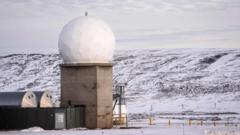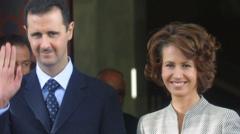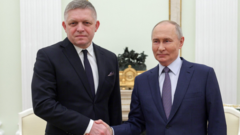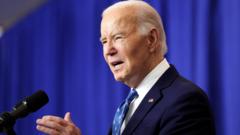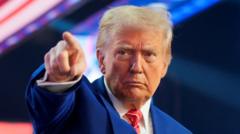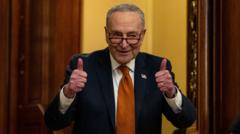In recent days, both the Biden administration and the Kremlin have initiated critical moves that could shift power dynamics in the ongoing Ukraine war. Russia's renewed large-scale missile attacks coincide with the U.S. government’s approval of long-range missile strikes from Ukraine, sparking fears of intensified conflict. The situation reflects a potential strategic game by Russian President Vladimir Putin to bolster his position ahead of Trump's return, while President Biden's decisions seem to signal an evolving military commitment to Ukraine.
Escalation in Ukraine: Russia and US Prepare for Shifting Dynamics as Trump Returns

Escalation in Ukraine: Russia and US Prepare for Shifting Dynamics as Trump Returns
As Russia ramps up missile strikes in Ukraine, tensions escalate between Washington and Moscow two months before Donald Trump’s potential return to power.
Biden’s administration has taken a bold step by allowing Ukraine to launch long-range ATACMS missiles, specifically targeting Russian territory as part of a response to the escalation represented by thousands of North Koreans fighting alongside Russian forces. This change appears aimed at countering Moscow's aggressive tactics, which include loosening nuclear weapon usage policies and escalating missile strikes against Ukraine, marking one of the most severe attacks in recent months.
Military analysts have pointed out that Russia is keenly aware of the upcoming potential leadership change in the U.S. and may be leveraging its actions to assert dominance before Trump returns. Despite Biden’s renewed commitment to Ukraine’s defense, critics—including some within the Trump camp—have voiced concerns about the potential for escalating conflict, indicating a political minefield that could complicate future negotiations.
Further complicating the situation is the psychological aspect of warfare at play, as strategists note that Russian missile stockpiling precedes secretive diplomatic talks about future interactions with a Trump-led administration. Analysts like Mykhaylo Samus stress that Moscow's military posturing is intricately linked to its strategic narrative as it prepares for negotiations.
While stalwarts of the Biden administration emphasize the need to maintain significant military aid to Ukraine, the specter of Trump complicates this narrative. Russian officials are reportedly making modest demands for any peace initiative, while Ukrainian President Volodymyr Zelensky underscores the dire consequences of any reduction in U.S. support. His 10-point resilience plan signals a commitment to preserve Ukrainian integrity, even as he acknowledges the political ramifications of prolonged conflict.
Despite these maneuvers, experts express skepticism about the probability of a lasting peace under the current conditions, with significant skepticism regarding any favorable outcomes from future engagements with Putin. In light of these dynamics, the months ahead are likely to be crucial for both Ukraine and its adversaries as they navigate a tense geopolitical landscape.
As the situation unfolds, all eyes will be on Washington and Moscow, each calculating their next strategic moves in a conflict that has far-reaching implications.
Military analysts have pointed out that Russia is keenly aware of the upcoming potential leadership change in the U.S. and may be leveraging its actions to assert dominance before Trump returns. Despite Biden’s renewed commitment to Ukraine’s defense, critics—including some within the Trump camp—have voiced concerns about the potential for escalating conflict, indicating a political minefield that could complicate future negotiations.
Further complicating the situation is the psychological aspect of warfare at play, as strategists note that Russian missile stockpiling precedes secretive diplomatic talks about future interactions with a Trump-led administration. Analysts like Mykhaylo Samus stress that Moscow's military posturing is intricately linked to its strategic narrative as it prepares for negotiations.
While stalwarts of the Biden administration emphasize the need to maintain significant military aid to Ukraine, the specter of Trump complicates this narrative. Russian officials are reportedly making modest demands for any peace initiative, while Ukrainian President Volodymyr Zelensky underscores the dire consequences of any reduction in U.S. support. His 10-point resilience plan signals a commitment to preserve Ukrainian integrity, even as he acknowledges the political ramifications of prolonged conflict.
Despite these maneuvers, experts express skepticism about the probability of a lasting peace under the current conditions, with significant skepticism regarding any favorable outcomes from future engagements with Putin. In light of these dynamics, the months ahead are likely to be crucial for both Ukraine and its adversaries as they navigate a tense geopolitical landscape.
As the situation unfolds, all eyes will be on Washington and Moscow, each calculating their next strategic moves in a conflict that has far-reaching implications.


